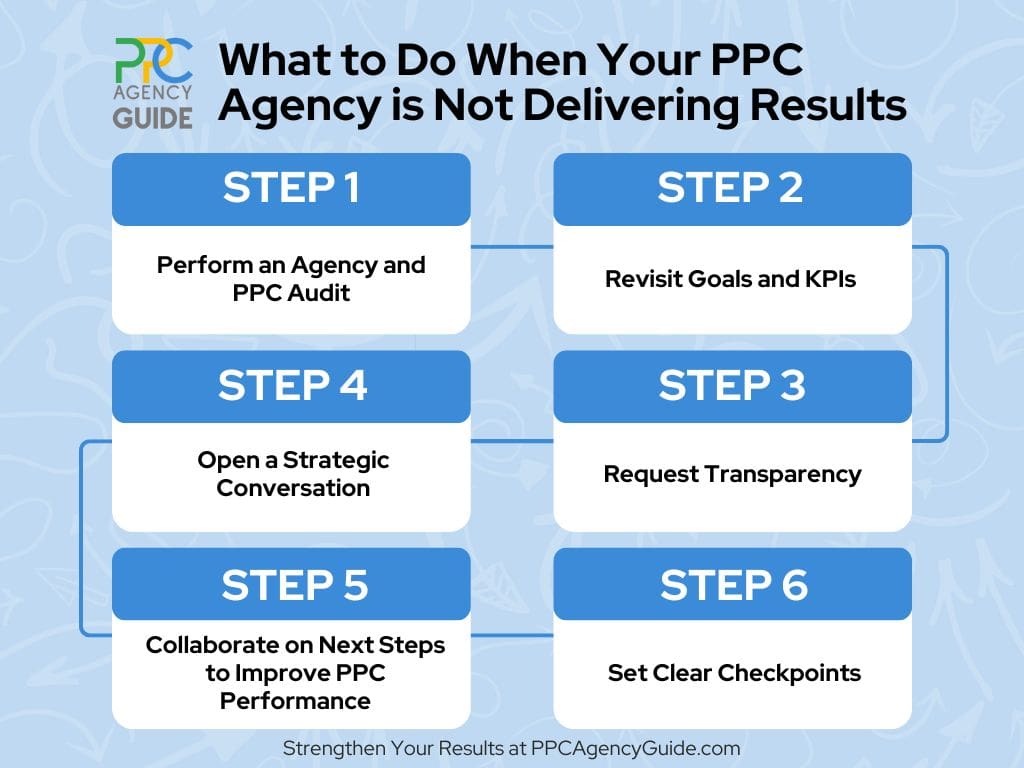
Are you starting to feel a little uneasy each month when you cut a check to your pay-per-click (PPC) agency, or started wondering if the number of leads and sales you’re getting is worth the expense? Maybe you’ve even questioned if paid advertising works for your industry at all. Odds are, your gut is right and your PPC agency is not delivering results like it should be. After all, a typical business gets $2 back for each $1 spent on Google Ads, according to the platform. Some platforms perform even better.
However, that doesn’t mean you should have a knee-jerk reaction and move on the second things seem off. There are very valid reasons why progress may be slow at times. Give us a few minutes and we’ll walk you through how to tell if it’s a problem with your current agency and what to do if it is.
Warning Signs of Poor Management and PPC Campaign Performance
Before we get into what to do when a PPC agency is not performing, let’s explore what that actually looks like in practice.
Limited Transparency
If your reports are full of clicks and impressions but light on conversions, revenue, or return on investment (ROI), that is a red flag. An agency should be eager to connect performance data to your actual business outcomes.
Misaligned Goals
Campaigns that run without regard to your sales targets or customer journey suggest the agency does not fully understand your business. Success should always be defined in terms of your objectives, not just theirs.
Stagnant or Low ROAS from PPC
Rising ad spend with low, flat, or declining return on ad spend (ROAS) signals poor account management. A proactive agency should address this trend early, with clear steps for recovery.
High Clicks, Low Conversions
Driving traffic is only half the equation. If landing pages are not converting and the agency is not making recommendations to fix them, performance will continue to suffer.
Each platform, ad type, and industry will perform a little differently. For instance, the average conversion rate for Google Search Ads is 7.5 percent, per WordStream. Yet, those in the business service industry come in a little lower at 5.1 percent, and real estate sits at just 3.3 percent. To confirm if your ads are converting at lower-than-normal levels, check your figures against benchmarks.
Generic Optimization
One-size-fits-all strategies, recycled ad copy, or infrequent adjustments point to an agency that is not actively improving your account.
Weak Communication
Slow responses, vague explanations, or resistance to tough questions are warning signs that your agency is more focused on keeping you quiet than keeping you informed.
Lack of Proactivity
Perhaps the biggest warning sign of all is silence when numbers slip. Every account hits bumps, but a capable agency acknowledges them and comes prepared with strategies to test, budgets to shift, and creative ideas to try. If your agency is waiting for you to notice problems instead of leading the charge to solve them, results will only continue to erode.
What to Do When Your PPC Agency’s Not Delivering Results
Before assuming the worst, it is important to remember that PPC campaigns take time to mature. Most accounts need several weeks of data before meaningful optimization can happen. In fact, it often takes up to three months before results stabilize and start to show their true potential. If you are still within that early window, what looks like underperformance may simply be the normal testing phase.
Once you are past the early stages, however, and the warning signs continue, there are constructive steps you can take to get performance back on track.
Perform an Agency and PPC Audit
Start by auditing your PPC agency. Consider their traits and how well you work together. Then, audit your PPC campaigns. Evaluate campaign setup, targeting, creative, and tracking to identify gaps or missed opportunities. The audits will help you validate your concerns and give you a strong foundation for informed conversations with your agency.
Revisit Goals and Key Performance Indicators (KPIs)
Sit down with your agency to ensure the metrics they are tracking line up with your business objectives. If you care about lead quality or customer acquisition cost, clicks alone will not tell you what you need to know.
Request Transparency
Ask for full access to ad accounts and detailed reporting that connects spend to revenue. Transparency builds trust and makes it easier to identify areas needing improvement.
Open a Strategic Conversation
Rather than pointing to numbers alone, invite your agency to explain their approach. What tests are underway? What adjustments are planned? A proactive partner will be ready with specifics.
Collaborate on Next Steps to Improve PPC Performance
Make sure there is a shared plan for landing page updates, ad copy tests, budget reallocations, and new keyword or audience strategies.
Set Clear Checkpoints
Agree on timelines to review progress. This avoids vague promises and ensures accountability while still giving campaigns room to develop.

When to Leave a PPC Agency
Strong agencies face challenges, but they own the problems and guide you through solutions. The time to leave comes when you’ve already given your agency the chance to correct issues and they still fail to deliver.
Repeated Recovery Attempts Fail
If you’ve performed an audit, clarified goals, and set checkpoints without improvement, further waiting only drains your ad spend.
Promises without Action
An agency that outlines strategies but never follows through on testing, optimizations, or creative updates cannot be trusted to drive results.
Always Playing Catch-Up
A reliable partner raises issues before you do and comes prepared with a plan. If your agency only reacts after problems escalate, they are not leading your account effectively.
Deep Misalignment
Some partnerships simply do not fit, whether due to weak industry knowledge, poor communication, or a lack of understanding of your priorities. When alignment is missing, growth stalls.
Ongoing Underperformance
After months of consistent effort, if ROI remains flat and no credible plan is in place to improve it, the partnership has reached its limit.
How to Fire Your PPC Agency Gracefully
Parting ways with an agency is never easy, but the way you handle the transition can protect your brand reputation and ensure a smoother handoff. A professional exit also helps you retain control of your accounts and data, which are essential for moving forward.

Review Your Agreement
Revisit the contract for notice periods, termination clauses, and final invoicing details. Understanding your obligations before initiating the conversation prevents surprises.
Keep it Professional
Focus discussions on results and expectations rather than emotions. Clear, concise communication shows respect and keeps the process constructive.
Secure Account Access and Data
Confirm you have full ownership of ad accounts, campaigns, historical performance data, and creative assets. This ensures your next agency or in-house team can build on existing work rather than starting from scratch.
Provide Adequate Notice
If your agreement requires 30 days, honor it. This gives both sides time to wrap up reporting, transfer assets, and avoid service gaps.
Close with Courtesy
A simple thank-you for the work completed goes a long way, even if the results fell short. Ending on good terms helps preserve your professional reputation.
Boost PPC Performance with the Right Partner
If you’ve tried to work things out with your PPC agency and things still aren’t clicking, switching to a new agency that’s a better fit can breathe new life into your campaigns and help ensure you’re getting the return you deserve. We work with experienced firms across the globe that specialize in a variety of industries and platforms, plus have a proven track record for success, and we’re happy to match you with one at no cost to your business. To take the first step, request a complimentary consultation.
FAQs on What to Do When Your PPC Agency’s Not Delivering Results
How do I change my PPC agency?
The process of switching PPC agencies is usually straightforward. Start by reviewing your contract for termination terms and notice periods. Secure access to all ad accounts, historical data, and creative assets before ending the relationship. Communicate your decision professionally, then onboard the new agency with a detailed handoff to ensure campaigns transition smoothly without disrupting performance.
Does PPC certification matter when choosing a new agency?
Certifications for platforms like Google Ads or Microsoft Ads show familiarity with platform tools but don’t guarantee strategic expertise. Use them as one factor, but weigh proven results, industry knowledge, and communication style more heavily. A certified team is helpful, but a strong track record matters far more for success.
Are poor PPC campaign results always the agency’s fault?
Not always. Market conditions, seasonal demand shifts, or weak landing pages can affect performance. A capable agency acknowledges these challenges and adapts its strategy. If results stay flat despite multiple adjustments and collaborative efforts, accountability shifts back to the agency. The key is whether they are proactive in solving issues.
What should I do if I see a PPC performance decline?
First, review timelines to ensure the decline isn’t part of natural testing or seasonality. Next, request an audit to identify structural or strategic gaps. Discuss findings with your agency and agree on corrective actions. If they dismiss concerns or lack a recovery plan, it may indicate deeper issues.
What are some bad PPC agency signs?
Warning signs include vague reporting, lack of account access, generic ad copy, and slow responses. Agencies that focus only on vanity metrics or avoid tough conversations are also red flags. Knowing how to review your PPC agency helps you separate temporary setbacks from deeper management problems.
How can I evaluate a PPC agency?
Look for case studies with measurable outcomes, ask about their approach to strategy and testing, and confirm they tie results to business goals. Transparent reporting, clear communication, and industry experience are strong indicators. Evaluating agencies on both technical skills and cultural fit ensures you find the right partner.


















